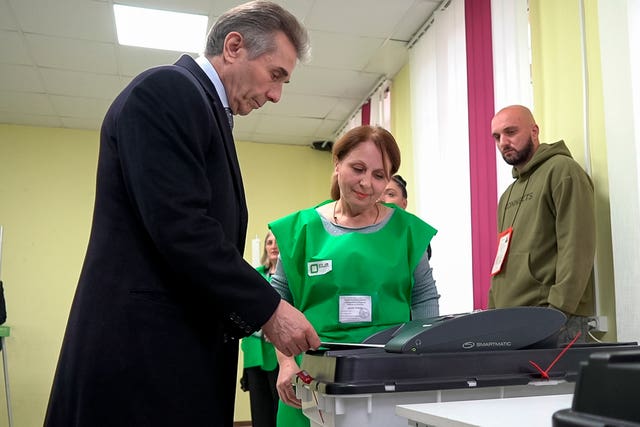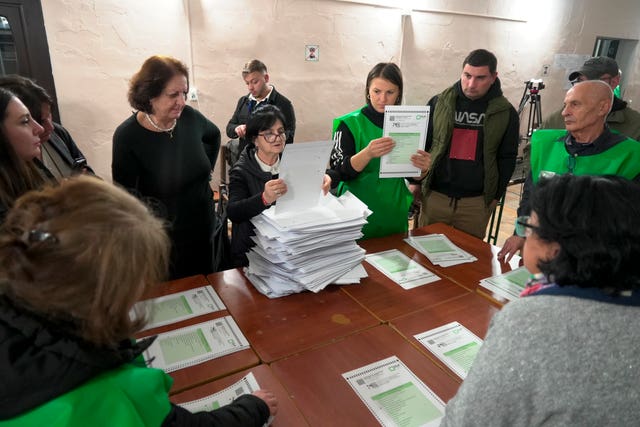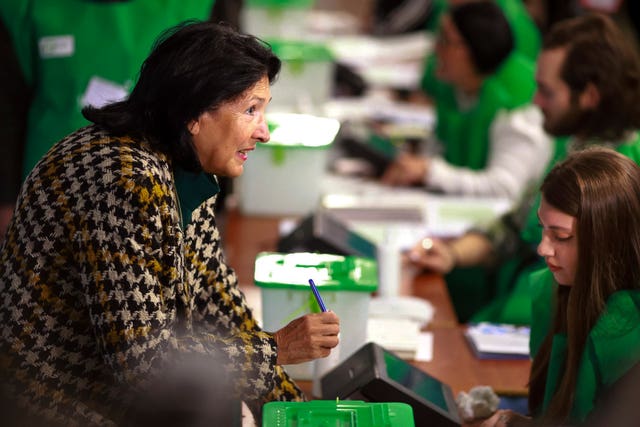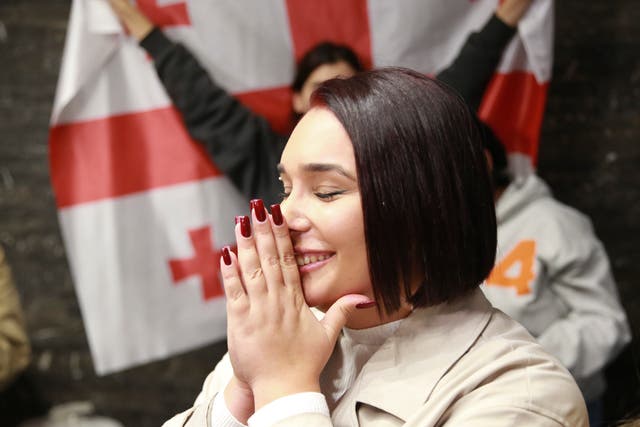Many Georgians saw the vote as a referendum on whether to join the European Union.
Initial data showed voter turnout was the highest since the ruling Georgian Dream party was first elected in 2012.

The Central Election Commission (CEC) of Georgia reported that Georgian Dream won 52.99% after the majority of the votes were counted.
Not all paper ballots and votes cast by Georgians abroad have been counted and it is unclear when the final result may be announced.
Georgian Dream faced off against four main opposition groups who indicated they did not accept the results.
The opposition initially declared victory shortly after the polls closed at 20:00 local time (16:00 GMT).
If Georgian Dream’s victory is confirmed, the party will have a parliamentary majority, stoking fears about the country’s bid for EU membership.
The party has become increasingly authoritarian, passing laws similar to those used by Russia to suppress free speech.
After one such law was passed earlier this year, Brussels halted Georgia’s EU membership process.
Bidzina Ivanishvili, the founder of Georgian Dream, declared victory almost immediately after the polls closed and said: “It is rare in the world that the same party achieves such success in such a difficult situation.”

Tina Bokuchava, head of the opposition United National Movement party, accused the CEC of carrying out Mr Ivanishvili’s “dirty order” and said he “stole victory from the Georgian people and thus stole the European future”.
She indicated that the opposition will not accept the results and “will fight like never before to reclaim the European future”.
Georgian election monitors, who deployed thousands of people across the country to monitor the vote, said there were numerous irregularities and the results “did not correspond to the will of the Georgian people”.
The election campaign in the South Caucasian nation of 3.7 million people, which borders Russia, was dominated by foreign policy and marked by a bitter battle for votes and accusations of a smear campaign.
Some Georgians complained of intimidation and pressure to vote for Georgian Dream, while the opposition accused the party of waging a “hybrid war” against its citizens.
The largest opposition party, the United National Movement, said its headquarters were attacked on election day.
Georgian media also reported that two people were taken to hospital after being attacked outside polling stations, one in the town of Zugdidi and the other in Marneuli, a town south of the capital Tbilisi.
There were also reports of irregularities in the voting.
A video shared on social media on Saturday also showed a man stuffing ballot papers into a box at a polling station in Marneuli.
Georgia’s Ministry of Internal Affairs said it had launched an investigation, and the Central Election Commission said a criminal case had been opened and that all polling station results would be declared invalid.
Ahead of the parliamentary election, Mr Ivanishvili – a shadowy billionaire who created Georgian Dream and made his fortune in Russia – again vowed to ban opposition parties if his party won.

Georgian Dream will hold opposition parties “fully accountable with the full force of the law” for “war crimes” committed against the people of Georgia, Ivanishvili told a pro-government rally in Tbilisi on Wednesday.
He did not explain what crimes he believed the opposition had committed.
Many believed the election was the most important vote since Georgia gained independence after the collapse of the Soviet Union in 1991.
Georgian President Salome Zurabishvili described them as “existential elections”.
Georgians want “European integration, they want to move forward and they want policies that will bring us a better, more stable future,” Christine Tordia, 29, told The Associated Press (AP) shortly after the vote in Tbilisi.
About 80 percent of Georgians support joining the EU, according to polls, and the country’s constitution obliges its leaders to seek membership in the bloc and NATO.
But Brussels has put Georgia’s bid to join the EU on hold indefinitely after the ruling party passed a “Russian law” curtailing freedom of speech in June.
Many Georgians fear the party is pushing the country toward authoritarianism and killing hopes it could join the EU.

The election “is not just about changing the government, but whether Georgia will survive or not, because Ivanishvili’s government means Russia,” said Nika Gvaramiya, leader of the Coalition for Change, an opposition group.
Mr Ivanishvili voted on Saturday morning amid heightened security.
He did not respond to an AP question about whether he wants to form an alliance with Russia.
He said the election was a choice between “a government that will serve you” or “choosing agents of a foreign country who will only do the foreign country’s bidding.”
Mr Ivanishvili did not specify which country he was referring to, but before the election he and his officials claimed that a “party of global war” sought to influence the EU and the US, expand the conflict in Ukraine and force Georgian Dream to cede power.
Opposition parties ignored Ms Zurabishvili’s demand to unite into one party, but signed her “charter” to carry out the reforms required by the EU to join.
Georgian Dream put up billboards across the country contrasting black-and-white images of the destruction in Ukraine with colorful images of life in Georgia along with the slogan “Say no to war – choose peace.”
The ruling and opposition parties have told voters they will pursue EU membership, although laws passed by Georgian Dream have put that hope on hold.
At last week’s EU summit, EU leaders said they had “serious concerns about the course of action taken by the Georgian government”.
Georgian Dream faced three coalitions: National Unity Movement, Coalition for Change and Strong Georgia.
The Gakharia Party for Georgia, founded by former Prime Minister Giorgi Gakharia, has said it will not enter into an alliance with anyone but will support the opposition to form a government.
